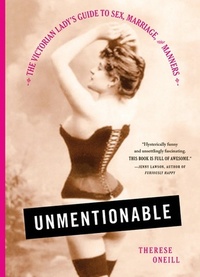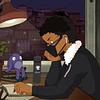Take a photo of a barcode or cover
603 reviews for:
Unmentionable: The Victorian Lady's Guide to Sex, Marriage, and Manners
Therese Oneill
603 reviews for:
Unmentionable: The Victorian Lady's Guide to Sex, Marriage, and Manners
Therese Oneill
Well if you ever thought that you should have been born in the Victorian era, then read this book and see how good we have it here in the 21st century, and wouldn't trade it. I knew many of the things mentioned in this book, but several things were fascinating to get more info on. This should be checked out for the absurdity of methods/lifestyles back then. However, you're going to need a strong stomach.
I studied this stuff for fun and for a degree. I was pumped when I found it and immediately dove into it when it arrived on my doorstep. A day later, I'm finished. And disappointed . It's an easy read but the snark was ceaseless, the focus too narrow and the reliance on advertisements and popular media of the day misleading. It's as if the author took every stereotype about the Victorian era and looked for information to back it up. I'm going to be a little dramatic and say she's done the period, and the casual reader, a disservice.
I understand that the point of the book is to combat the romanticizing of a difficult, often-times dirty time in history and to do that, the easiest route is to show the filth, but it seemed cheap in execution and poorly researched. There were a few moments when I laughed - at how wrong something was. I'm sure other people who have studied this period and done their research shared in my reaction.
Also, the fact that Oneill drew from American and Canadian sources irked me. Call me a purist but I think if you're using "Victorian" it's solely England (or Great Britain, rather) we're talking about since it refers to that country's queen. It's just the 19th century in the Americas. The social experience was dissimilar enough that you shouldn't be lumping them together and talking about them interchangeably. Also irksome was Oneill's presentation of images. Many of the images were ones that I have come across before and the real stories behind them, the true captions, are so much more interesting than the author's attempt at sass and wit.
Please, do yourself a favor. If you are really interested in the every day experience of your typical Victorian, read Ruth Goodman's "How to Be a Victorian." Not only is it thorough, well-researched and easy to read, Goodman has actually done research beyond books. She has done chores like Victorians, made and eaten food like Victorians, made clothes and worn them (all of the layers!) like Victorians, tried (safe) popular cosmetic and medicinal recipes like Victorians. She shows a respect for the era that was utterly lacking in Oneill's book.
I wish I didn't know so much about the Victorian period. If I didn't, I probably would have liked this so much more. My only hope is that people that like this book continue to read about the era and find books that show them it was so much more than Oneill leads us to believe.
I understand that the point of the book is to combat the romanticizing of a difficult, often-times dirty time in history and to do that, the easiest route is to show the filth, but it seemed cheap in execution and poorly researched. There were a few moments when I laughed - at how wrong something was. I'm sure other people who have studied this period and done their research shared in my reaction.
Also, the fact that Oneill drew from American and Canadian sources irked me. Call me a purist but I think if you're using "Victorian" it's solely England (or Great Britain, rather) we're talking about since it refers to that country's queen. It's just the 19th century in the Americas. The social experience was dissimilar enough that you shouldn't be lumping them together and talking about them interchangeably. Also irksome was Oneill's presentation of images. Many of the images were ones that I have come across before and the real stories behind them, the true captions, are so much more interesting than the author's attempt at sass and wit.
Please, do yourself a favor. If you are really interested in the every day experience of your typical Victorian, read Ruth Goodman's "How to Be a Victorian." Not only is it thorough, well-researched and easy to read, Goodman has actually done research beyond books. She has done chores like Victorians, made and eaten food like Victorians, made clothes and worn them (all of the layers!) like Victorians, tried (safe) popular cosmetic and medicinal recipes like Victorians. She shows a respect for the era that was utterly lacking in Oneill's book.
I wish I didn't know so much about the Victorian period. If I didn't, I probably would have liked this so much more. My only hope is that people that like this book continue to read about the era and find books that show them it was so much more than Oneill leads us to believe.
A hilarious, blunt romp through practical women's history. For anyone who has ever watched a BBC bonnet and corset and sighed for a simpler life, this is required reading. From arsenic in your face cream, to the many household items which could inadvertently maim or maul you, to the sheer scale of the everyday filth, it makes you grateful for the basics...like suffrage, hygiene products, and legal autonomy.
Written in a chatty, sly voice not everyone will like the conceit, but I found it great fun for an audiobook experience.
Written in a chatty, sly voice not everyone will like the conceit, but I found it great fun for an audiobook experience.
Every single page had mind-blowing astounding facts and it was hilarious. A fantastic read if you like history or ever dreamed of wearing a corset (you'll change your mind...).
"You think you know the nineteenth century well, as a place of chivalry and honor, gilded beauty and jolly servants. You've been there before, many times, but only as a guest, an observer. Dark-eyed Heathcliff has obsessed over your windblown soul in a universe where no one ever has to poop."
This book is absolutely delightful. It is hilarious and well-researched and cringey in all the right ways. If you have ever wondered what it was really like to be a Victorian lady, Therese Oneill has you covered. After reading this you will feel a brand new appreciation for things like tampons, bathing, and, you know, equal rights.
My favorite thing about this book, though, is that reading it made me really appreciate the fact that women have *always* been so amazing and ridiculous and wonderful no matter what life has thrown at us, and I felt a deep-reaching sense of sisterhood. Absolutely marvelous.
This book is absolutely delightful. It is hilarious and well-researched and cringey in all the right ways. If you have ever wondered what it was really like to be a Victorian lady, Therese Oneill has you covered. After reading this you will feel a brand new appreciation for things like tampons, bathing, and, you know, equal rights.
My favorite thing about this book, though, is that reading it made me really appreciate the fact that women have *always* been so amazing and ridiculous and wonderful no matter what life has thrown at us, and I felt a deep-reaching sense of sisterhood. Absolutely marvelous.
Unmentionable is a book for all the women who dream about traveling back in time and living in another century (particularly the 19th). In this work of nonfiction, Therese Oneill explains how un-romantic that dream is: from rancid food to the trials of menstruating before tampons, this book gets into the nitty-gritty details of the 1800's that Jane Austen never seemed to mention.
Unmentionable is written in a very distinct voice, as if an aunt is advising you on how you have to behave when you visit somewhere new, with little comments and quips throughout the book. I listened to the audiobook version of this text, and it came off as humorous and light-hearted, but I'm not sure if I would have liked it as much had I read the hard copy. Then again, the hard copy features photos that sound like they added a lot to the book, so I guess either way you're trading off.
The topics discussed include clothing and grooming, social etiquette, marital dynamics, and many, many more interesting parts of daily life in the 1800's that have never been brought to light before. I especially appreciated the focus on women; throughout history, nonfictional accounts of women's lives have been few and far between, and this book really gives an interesting look into what daily life would have been for them in that time period.
At only 8 hours, this audiobook was a quick listen, but I found it thoroughly entertaining and revelatory. I wound up telling a lot of my friends about it, and I think it would make a great book club read, especially for clubs that appreciate some historical fiction or romance.
Unmentionable is written in a very distinct voice, as if an aunt is advising you on how you have to behave when you visit somewhere new, with little comments and quips throughout the book. I listened to the audiobook version of this text, and it came off as humorous and light-hearted, but I'm not sure if I would have liked it as much had I read the hard copy. Then again, the hard copy features photos that sound like they added a lot to the book, so I guess either way you're trading off.
The topics discussed include clothing and grooming, social etiquette, marital dynamics, and many, many more interesting parts of daily life in the 1800's that have never been brought to light before. I especially appreciated the focus on women; throughout history, nonfictional accounts of women's lives have been few and far between, and this book really gives an interesting look into what daily life would have been for them in that time period.
At only 8 hours, this audiobook was a quick listen, but I found it thoroughly entertaining and revelatory. I wound up telling a lot of my friends about it, and I think it would make a great book club read, especially for clubs that appreciate some historical fiction or romance.
This book strongly implies that it combines the research of a Mary Roach, presented with the hilarious yet self-effacing wit of a Lindy West while failing utterly on both fronts. There's almost nothing here that I didn't already know from casual internet research (and Mary Roach), and after a couple hundred pages the constant bitter irony stopped being merely not funny and started to really grate on me. Her outrage is understandable, she's talking about outrageous things, but all the commentary left less room for facts that would have helped the reader better understand and empathize.
An entertaining history in a conversational, dear-reader style covering a variety of topics about Victorian womanhood.
dark
funny
informative
lighthearted
fast-paced
loved this book! it was informative in a super engaging and funny way. the narrator really brought the text to life- i also loved how there were multiple narrators (the main one and when a man’s work was cited a man would narrate the quotes)





